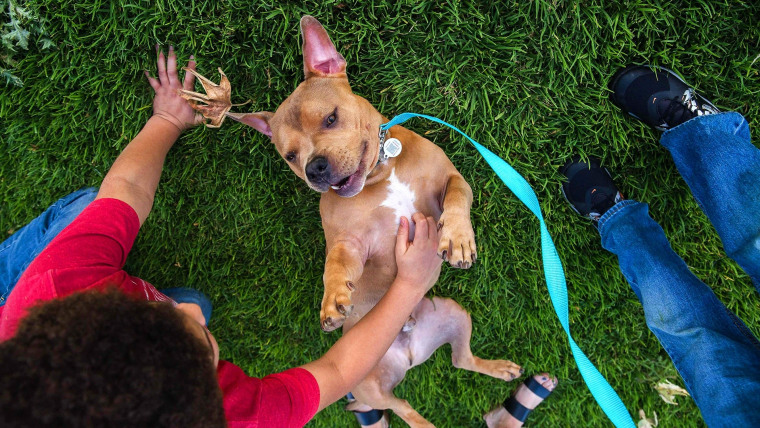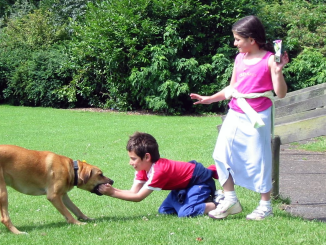Canine eggheads enjoy playing with toys and retrieving objects.

“Gifted” dogs, who have a rare talent for learning lots of words for objects easily, also turn out to be more playful than other dogs, a new study finds.
Prior research in humans has shown a link between playfulness and problem-solving abilities, so animal behavior researchers from Eötvös Loránd University in Budapest, Hungary, wondered if the same was true for rollicking pups.
What is a gifted dog? In the new study, it was Border collies who had proven in prior research that they were able to learn as many as 12 new words per week and then retain them for months.
To take a closer look at the possible association between giftedness and playfulness in dogs, Claudia Fugazza, a researcher in the university’s department of ethology (the study of animal behavior), and her colleagues asked the owners of 165 Border collies to fill out dog personality questionnaires. Twenty-one of the dogs were gifted and the other 114 were just randomly selected with no testing for word learning ability.
The surveys assessed the personality of the animals in five categories:
- Fearfulness, including fear of people, nonsocial fear, fear of dogs, fear of handling.
- Aggression toward people, including general aggression and aggression in certain situations.
- Activity/Excitability, including excitability, playfulness, active engagement and companionability.
- Responsiveness, such as trainability and controllability.
- Aggression toward animals, including aggression toward dogs, prey drive and dominance over other dogs.
For the evaluation of playfulness the owners were asked to rate their dogs in three areas:
- Dog gets bored in play quickly.
- Dog enjoys playing with toys.
- Dog retrieves objects, such as balls, toys and sticks.
The researchers focused solely on Border collies because earlier experiments found that the breed is more likely to be good at learning new words compared to others.
After collecting the survey responses, the researchers then compared the responses from owners of gifted dogs to those from the owners of dogs who had not been identified as gifted.
Playfulness was the only personality trait that was consistently different between the two groups.
It’s not clear from the study whether it’s the playfulness that helps the dogs learn more words, or whether the extra playful ones ended up with more opportunities to learn, said Fugazza, the study’s lead author, said in an email. That’s because gifted dogs tend to learn words for objects when their owners are playing with them.
Are playful dogs smarter?
Not exactly.
“Intelligence is the result of diverse cognitive traits that allow individuals to flexibly solve different types of problems,” Fugazza explained. “Giftedness refers to an extremely good capacity in the case of a specific skill.”
So, maybe gifted dogs are like people who score high on the verbal part of the SATs.
If your pup doesn’t learn words easily, it doesn’t mean it’s a dumb dog. Adam Boyko, an expert in canine genomics, reassures owners that canine intelligence is more than that.
“Both dogs and wolves are playful when they are puppies, but dogs really evolved to living in the human environment and to responding to social cues,” said Boyko, a specialist in the genetics of behavior and an associate professor at the Cornell University College of Veterinary Medicine. “It’s not surprising that the more playful ones exhibit better learning in the domain of learning human words. And it’s not surprising that Border collies, who are bred to respond to human cues, show the propensity to learn words more than other breeds.”

Other breeds of dogs might show intelligence in other ways, Boyko said. For example, wolves are very intelligent although they don’t typically pick up on human cues.
“But they can figure out how to escape,” said Boyko. “Where dogs would look for a person to help, wolves would see how humans did a latch and lock and then the wolves would do it themselves to get out.”
Boyko would like to take the study a step further and look at the genetics of the gifted dogs.
“This is a tantalizing correlation that might be meaningful if you are trying to build better service dogs,” he said.
One thing that can’t be determined from the study is whether the playfulness trait spurred owners to interact more with their dogs and thus teach them more words, said Dr. Nicholas Dodman, a professor emeritus at the Cummings School of Veterinary Medicine at Tufts University, CEO and president of the Center for Canine Behavior Studies and the author of “Pets on the Couch: Neurotic Dogs, Compulsive Cats, Anxious Birds and the New Science of Animal Psychiatry.”
Dodman said the study is interesting but needs to be replicated in a larger number of dogs.
“I would also like to see it done in a different breed,” he said.
The new findings might help people who want to buy or adopt a puppy. It suggests that playfulness might be a good attribute to consider.
“The playful ones might be more likely to interact with a person, assimilate words more easily and be more intelligent,” said Dodman.
Endearing Dedication: Pup Remains Loyal on Porch Despite Desertion, Inspiring Empathy and Deepening Family Bonds
Few things are as unjust as when a dog ends up in the care of irresponsible and selfish owners. Dogs shower their families with unconditional love, and it’s truly disheartening when this affection is met with selfishness and indifference.
In this heartrending tale, a beautiful pup named Cupid experienced heartbreak when his family decided to relocate and left him behind. Cupid watched in confusion as his beloved family packed their belongings, loaded their car, and drove away, leaving him behind without an explanation.

All he knew was that this place had been his home, and perhaps, if he waited patiently, his family would return. Fortunately, a compassionate neighbor took notice and contacted Janine Guido, the founder of Speranza Animal Rescue, after seeing Cupid sleeping alone on the porch.
“All I was told was that his owners moved out and left him behind,” Guido recounted. She tried approaching Cupid, but he retreated to his safe haven. She watched as he desperately jumped and scratched at the front door, almost pleading to be let back inside. Witnessing this broke Guido’s heart, and she felt a deep urge to help him.

Guido attempted to offer food to gain Cupid’s trust, but he only ran away. After a 30-minute chase, Guido found the right words to calm him down and reassure him. It may sound strange, but Guido swears that Cupid understood her. Finally, he allowed her to leash him.
“On the ride home, she continued to tell him what was happening, as he understood her,” the story unfolds. “He has been nothing but the sweetest gentleman since coming to the rescue. You can tell he’s still really confused. But he is happy to meet everyone with a wagging tail.”

In due time, Cupid will be ready to embark on the search for a forever family. While it’s disheartening to think about people abandoning their pets, it’s heartwarming to know that there are dedicated individuals like Guido working tirelessly to ensure these mistreated animals receive the love and care they deserve.
Once Cupid finds his forever family, he’ll be in the company of those who truly appreciate and reciprocate his affection.

If you ever come across a situation like this, providing a dog with food, water, and temporary shelter while seeking professional help is a compassionate gesture. However, it’s crucial to involve experts who can secure the dog’s long-term well-being and determine the best course of action.
Remember, every animal deserves love, care, and a safe environment. By reaching out to the appropriate authorities, you can play a vital role in ensuring that abandoned dogs receive the care and compassion they require and, hopefully, find a loving forever home where they’ll never face abandonment again.



Leave a Reply